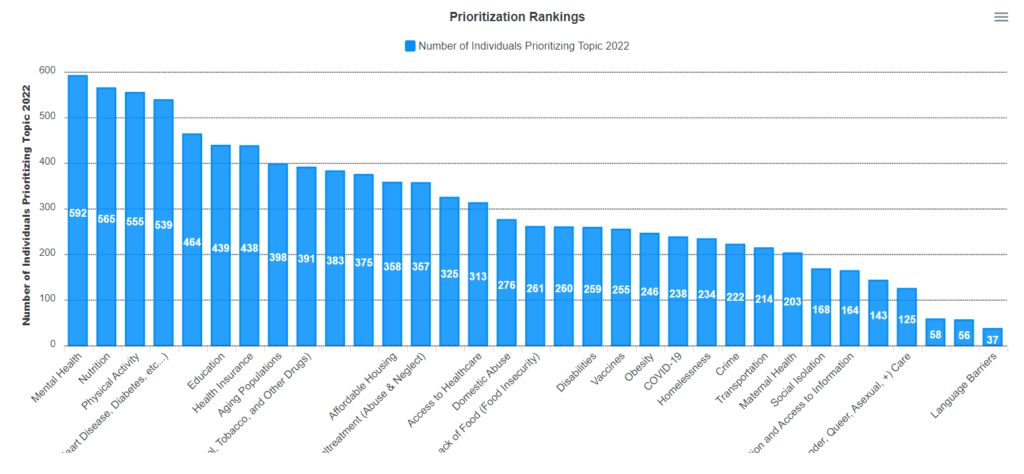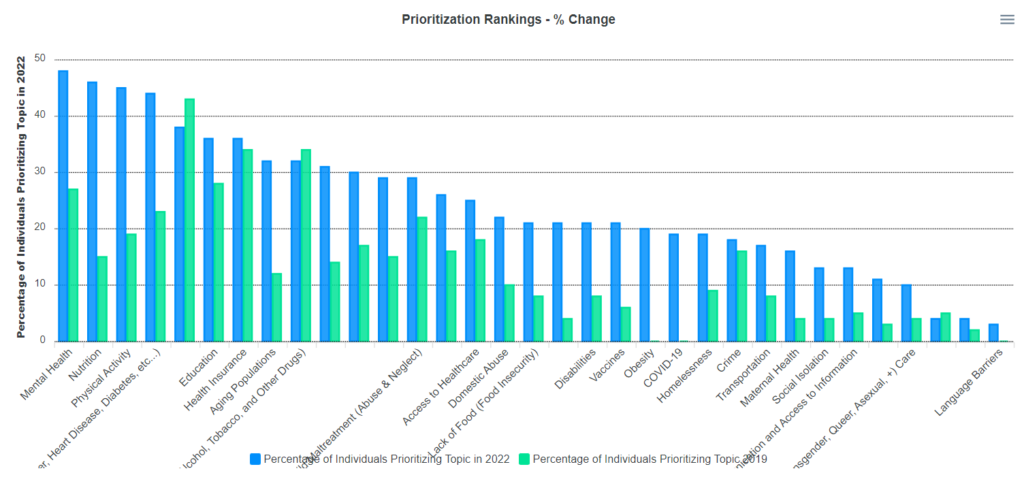DATA INSIGHT
A: Mental HealthCommunity Story
Mental health heavily influences our quality of life. So it makes sense that mental health, just like physical health, is a focus area of our collective community improvement work. Together we provide tools to new families, improve access to mental health services, support recovery, and lower the rate of death, disease, and disability among those with mental illnesses. We work with national campaigns to reduce stigmas and highlight local resources for those seeking treatment as we strive to eliminate health disparities and provide equitable access to health services. By taking part in this Data Insight you are helping to maintain your mental health by finding a sense of community as you learn and have opportunities to get involved on a variety of levels regarding mental health in Garrett County.
Below you’ll find our own primary data sets and the secondary sources that help us drive our decisions. We have real-time data sets, so anyone in the community can see how a given program or intervention is performing and join in the effort on mygarrettcounty.com. Contact information is available for leadership in the area of Mental Health, as well as, a list of coalitions open to the public that address various issues related to mental health. Current community resources and relevant areas of interest are also included.
Programs that address the factors that contribute to poor mental health or focus on interventions known to foster better mental health are highlighted. Identifying risk factors for mental illness, such as trauma and chronic health conditions, plays an important role in implementing successful prevention programs and allows for early intervention. Examples of those efforts can be found in a variety of Action Groups on mygarrettcounty.com. Ranging from early childhood programs, violence prevention initiatives, and programs for older adults.
Finally, we are always collecting data so we can be as informed as possible about our community. Please explore the take action section for more info about where we’re heading as a community.
Sources:
https://nami.org/Blogs/NAMI-Blog/November-2019/The-Importance-of-Community-and-Mental-Health
https://developingchild.harvard.edu/science/deep-dives/mental-health/
https://www.apha.org/topics-and-issues/mental-health
https://www.cdc.gov/violenceprevention/intimatepartnerviolence/prevention.html
https://www.cdc.gov/aging/pdf/mental_health.pdf
Data Story
Telling a story about our data is vital to understanding the impact of programs, systems, and improvement efforts in our community. Here’s the baseline data we have from our current Community Health Assessment regarding mental health. These datapoints are a collection of surveys and research, and provide information for our community to comprehensively create strategies. These datapoints are not comparative outside of the individual survey instruments.
Assessment Data
Mental Health was the category that most of our community voted for as their largest concern on this survey. This was an 80% increase since the 2019 data was collected. The chart below illustrates our community prioritization rankings in 2022 with the percentage of change in the next chart.
A interative version of this graph, with additional data, is available at: https://charp.garrettcountyapps.com/
A interative version of this graph, with additional data, is available at: https://charp.garrettcountyapps.com/
Focus groups were held in a guided conversation format about the top five issues people identified as their main concerns in our latest community prioritization survey. Below is the analysis of the focus group discussions about mental health conducted in June of 2022.
Below is the beginning of the focus group discussions about mental health conducted in June of 2022. To read the full analysis visit https://mygarrettcounty.com/cha2024/, and select the assessment narrative on page 10.
Focus Group Analysis
This priority and the themes central to Mental Health are synthesized from the focus groups and are consistent with the secondary data provided in this report. Mental Health ranked fifth three years ago, giving it an 80% increase to a first-place ranking this year. Every conversation began with some form of the deterioration of mental health due to the COVID-19 pandemic, namely isolation, and fear. For those that had mental health issues before COVID-19, they were only exacerbated due to a lack of services. Consensus relating to increases in abuse of all forms was discussed and the need for healthy relationship training, and stress management techniques are needed. Traditional gender roles were referenced relating to mental health as men in our rural traditional community are perceived by many as the primary provider and reaching out for help is seen as a weakness, making it more difficult and in some cases unacceptable to seek treatment perpetuating generational dysfunction. Social determinants of health were layered in these discussions as compounding factors that contribute to mental health needs.
MyGarrettCounty.com Action Group Data (Real-Time Data)
Garrett County Center for Behavioral Health Action Group
https://mygarrettcounty.com/groups/behavioral-health/raw-data/
The Garrett County Center for Behavioral Health Action Group is tracking multiple measures in real-time, including the utilization of crisis services, such as the Garrett County Mental Health Crisis Line. This screenshot is a snapshot of the current data, as of 11/16/2022. Click the link above to view data in real-time.
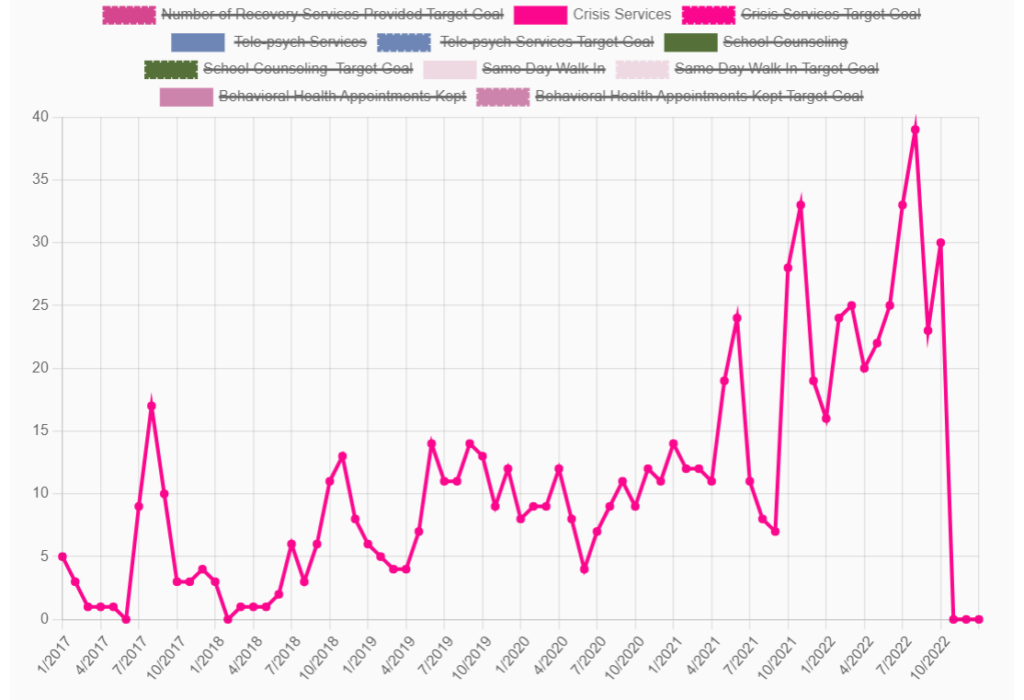
Supplemental Primary Data
From time to time we help other units within the health department collect data. This particular data set was issued by the Behavioral Health Authority. Keep in mind the sample size is small, but it is primary data. We’re highlighting two questions below:
Garrett County Behavioral Health Survey
https://mygarrettcounty.com/cha2024/
Q1: Depression and Anxiety are reported to be significant mental health issues in GC
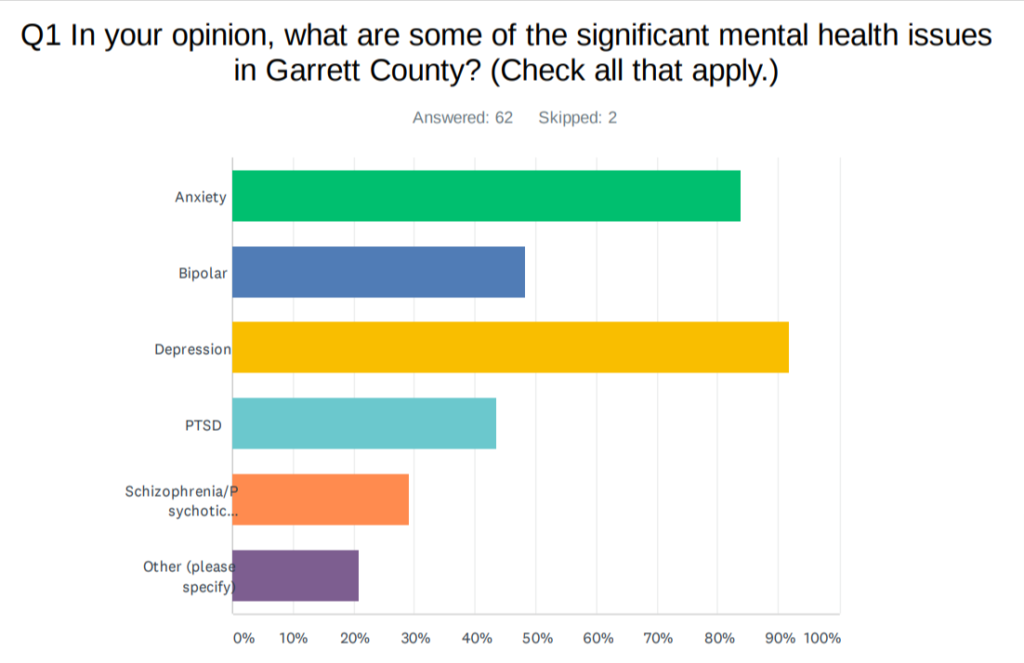

Q2 In your opinion, what needs to be done to address mental health issues in Garrett County?
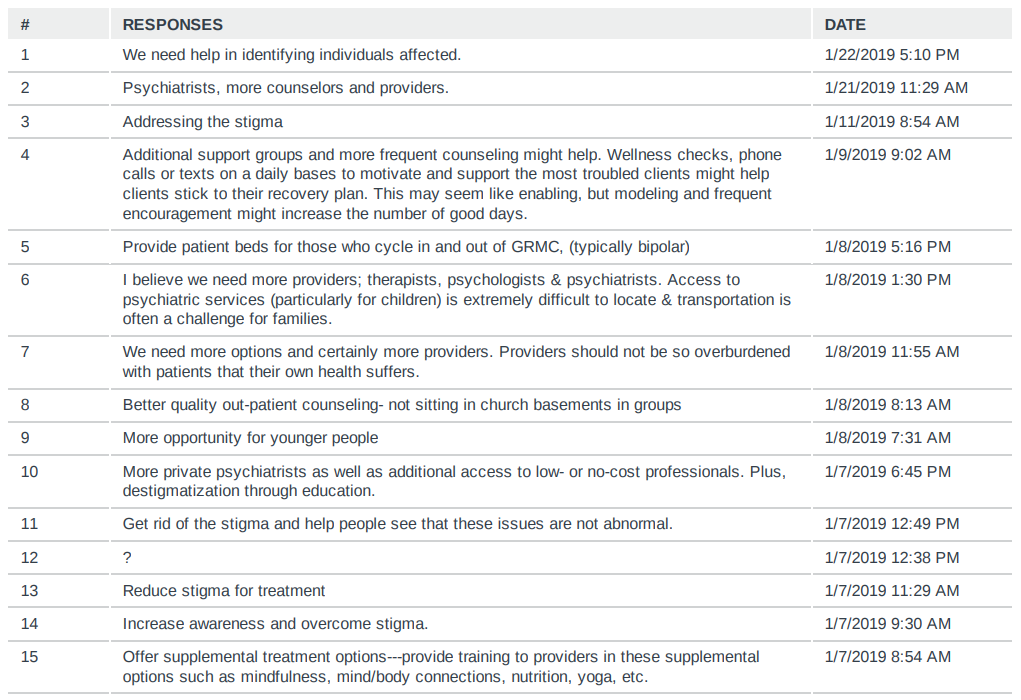
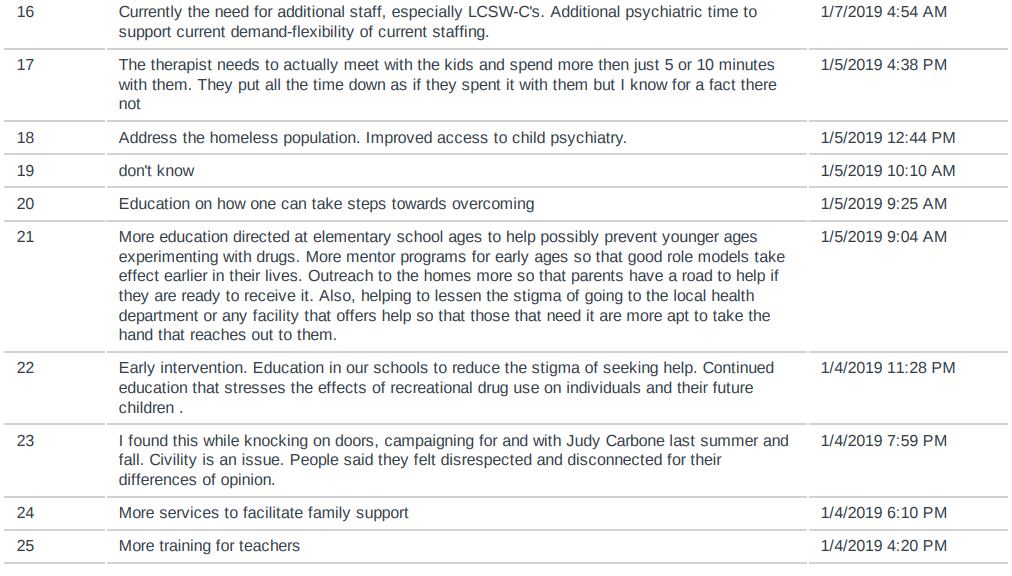
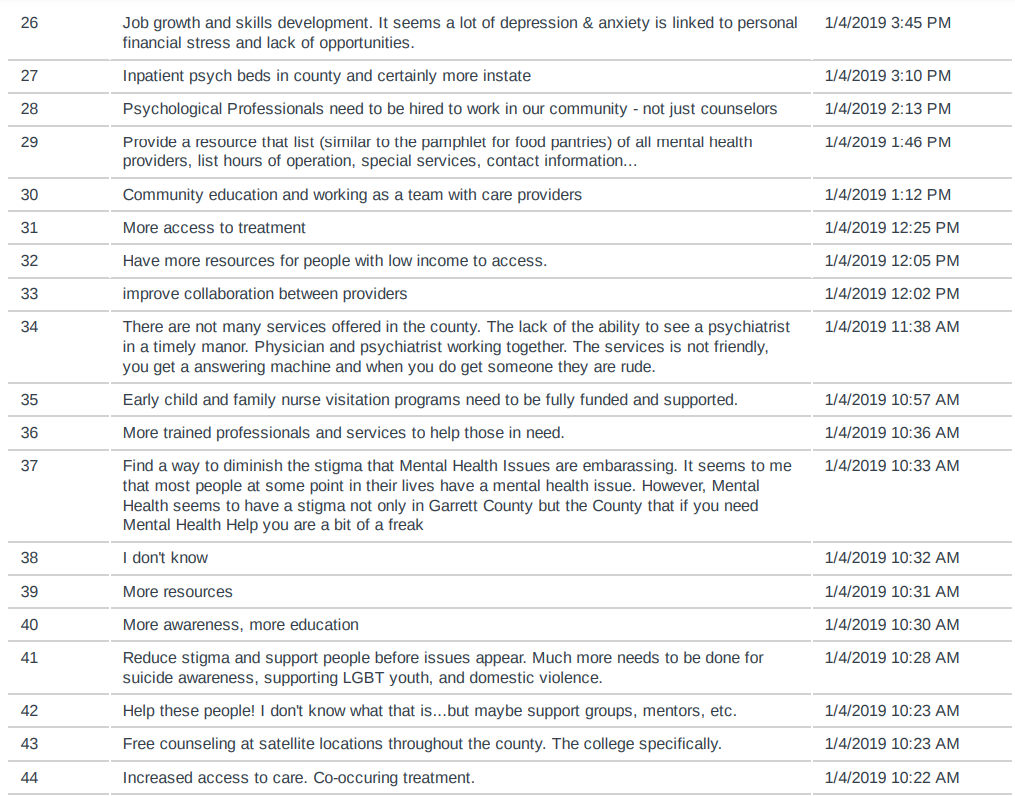
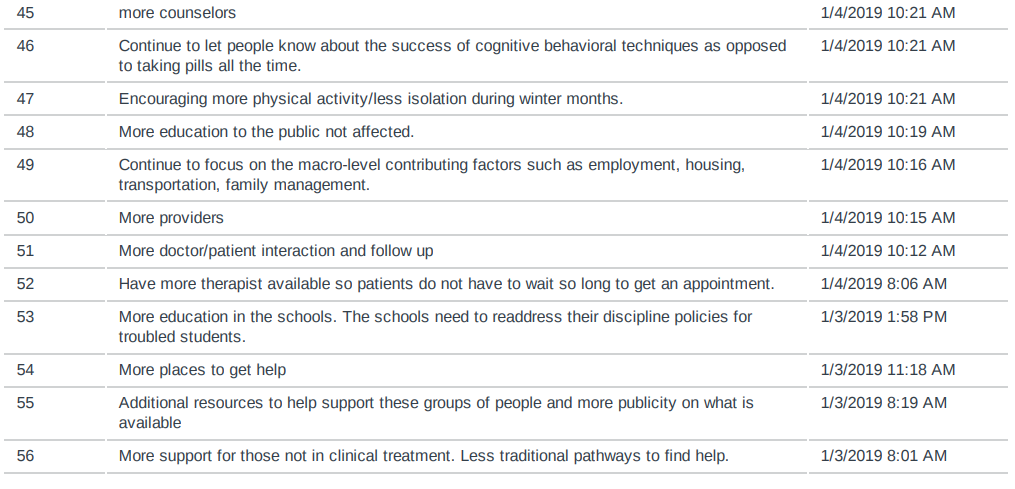

Garrett County Pandemic Health Assessment
https://mygarrettcounty.com/cha2024/
When the United States went into lockdown, various agencies supported vulnerable populations and food insecurity needs. The Office of Population Health, Innovation, & Informatics helped to manage interagency coordination through the Health Planning Council via a baseline survey. The intent was to utilize the data to begin coordinating local systems.
What’s unique about this survey is that within an hour of launching the survey we had over 1000 responses. This was a time when our community faced much uncertainty. We needed data specifically about food resources to set up collection sites. During this time, the survey method worked well for public health to have the data to take action. Below, a question that highlights increasing concerns about behavioral health is highlighted.
Q6 What is your greatest concern at this moment? Behavioral Health @ 10.73% (2nd to financial concerns 32.55%)
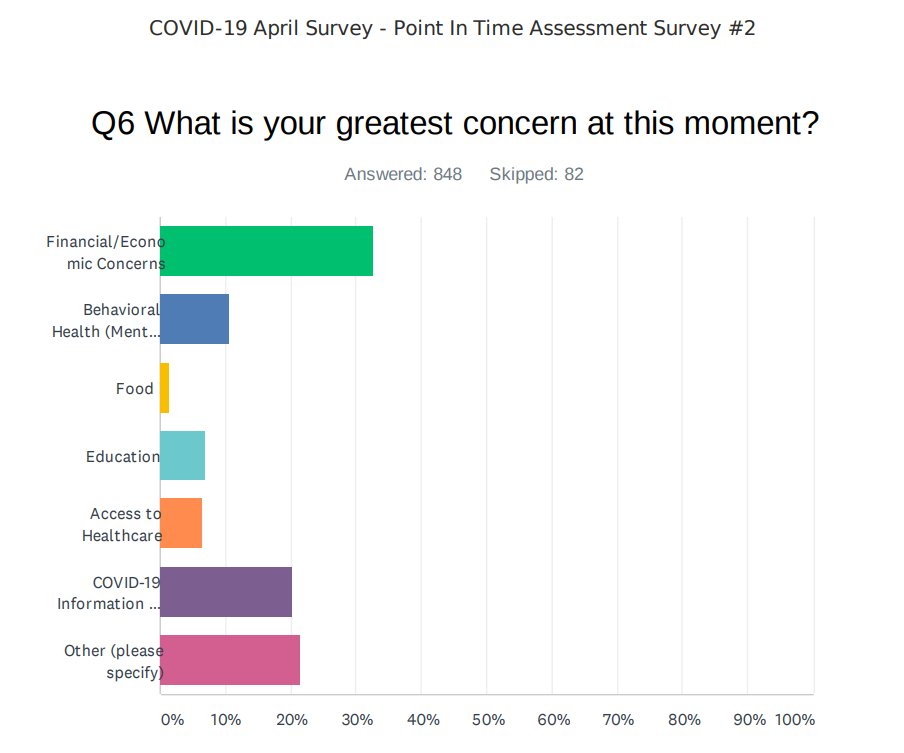
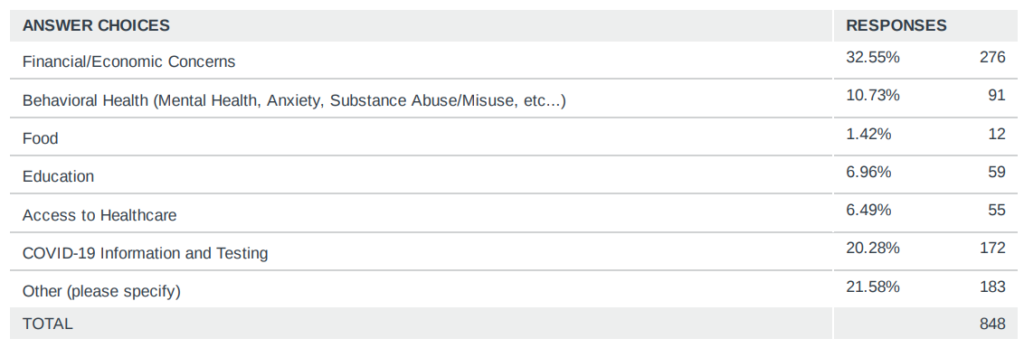
Well-Being Dataset: Go! Garrett County
https://mygarrettcounty.com/cha2024/ + Additional Data Collected
Originally funded by Maryland’s Community Health Resource Commission, Go! Garrett County.com is an innovative way to provide engagement and education while promoting local resources, and acting as the only data the county has collected about belonging. The longitudinal surveying on the website creates a knowledge base we are using to tailor specific programs to prevent and manage chronic diseases in Garrett County.
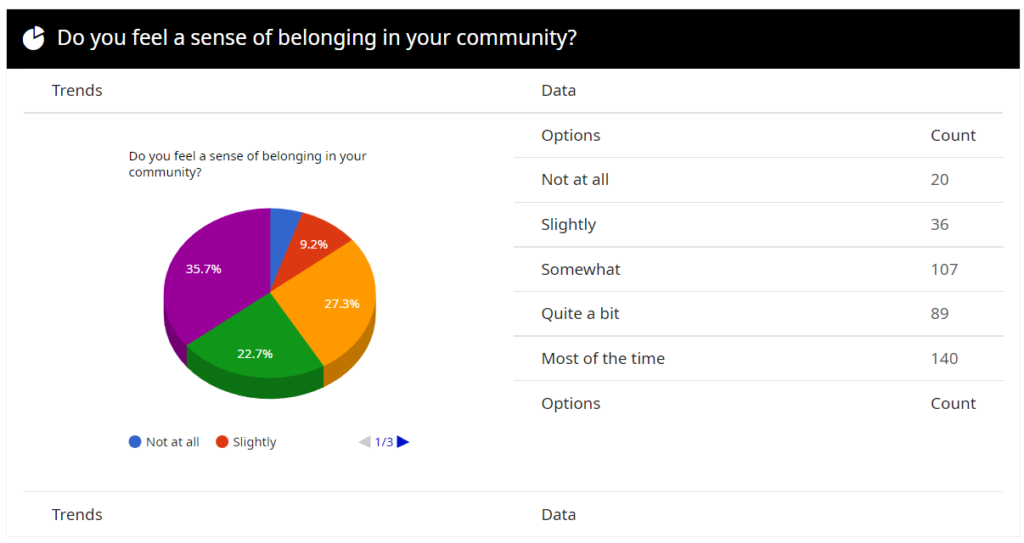
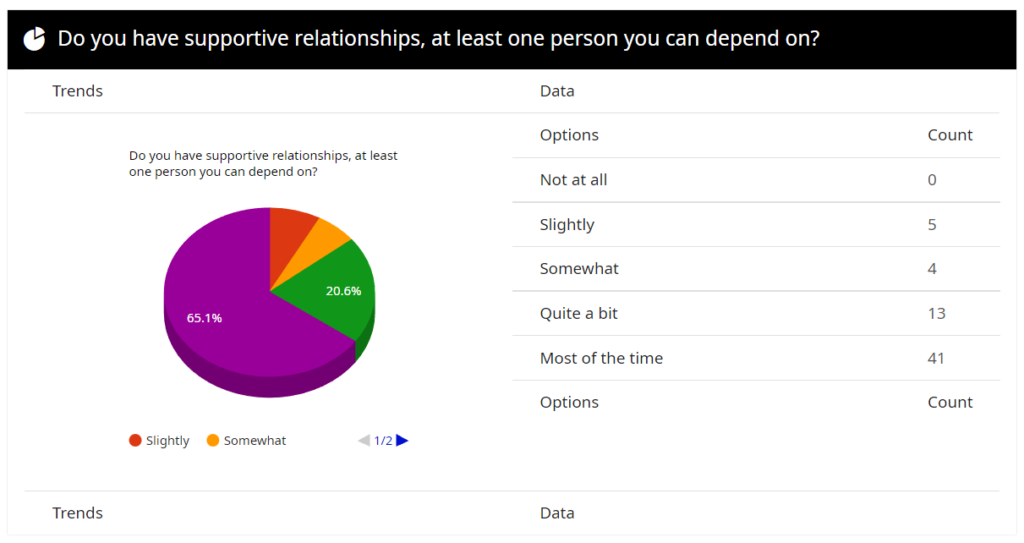
Secondary Data
Mental health is challenging to measure, in the data sources, we’ve collected about our community from other places (secondary) self-reported health status is a widely used measure of people’s health as it’s related to their quality of life.
Poor or Fair Health
This measure is an important indicator to understand the impact of physical and mental health on self reported health status.
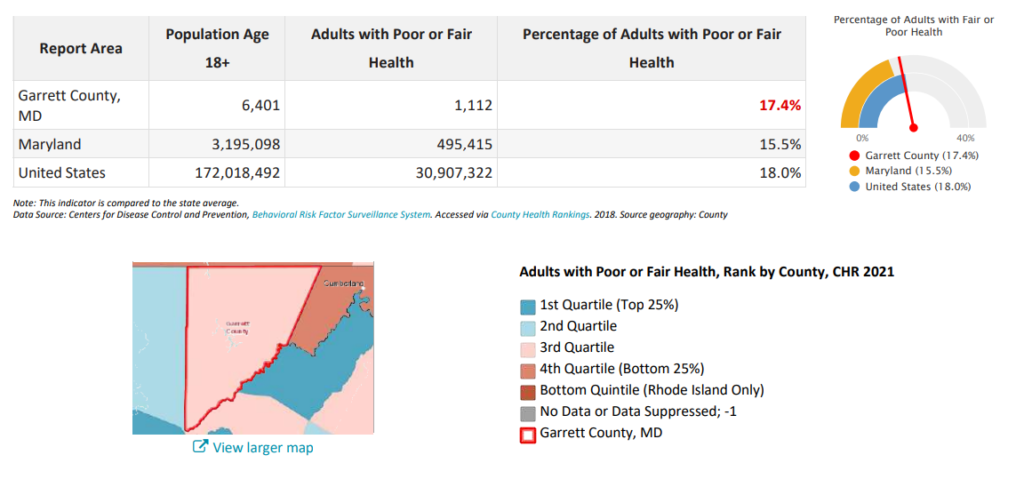
Source: Page 134 – Garrett County Community Health Assessment Indicators Report – Garrett County – https://mygarrettcounty.com/cha2024/
Take Action
In order to more closely analyze the current status of Mental Health (and Behavioral Health as a whole) in Garrett County, we are proposing a survey to collect supplemental data from community stakeholders based on the initial research conducted by the Garrett County Behavioral Health Authority in 2018/2019 (https://mygarrettcounty.com/garrett-county-community-health-assessment-2022-2024/), and the Youth/Child & Adolescent Survey Conducted in 2019/2020 (https://mygarrettcounty.com/docs/adolescent-wellness-survey-data/).
Comprehensive surveys are currently being planned to collect additional data. Stay tuned for updates!
Community Services
Crisis Line (Garrett County, Local): 301-501-3515
National Crisis Line: 988
Garrett County Center for Behavioral Health:
https://garretthealth.org/behavioral-health/
Explore Mental Health Providers on the Garrett County Resource Guide:
https://mygarrettcounty.com/resources/categories/mental-health-services
Compare Behavioral Health Providers in Garrett County (BHA Guide):
https://mygarrettcounty.com/provider-guide/
Materials & Media
Garrett County Behavioral Health Provider Guide:
https://mygarrettcounty.com/provider-guide/
Garrett County Crisis Line Flyer:
https://garretthealth.org/wp-content/uploads/2022/11/Crisis.pdf
Maryland 988 Outreach Toolkit:
https://health.maryland.gov/bha/Pages/988Toolkit.aspx
References & Resources
Related Garrett County Action Groups:
Behavioral Health Action Group
https://mygarrettcounty.com/groups/behavioral-health/
Behavioral Health Authority Action Group
https://mygarrettcounty.com/groups/behavioral-health-authority/raw-data/
Early Care Programs System of Care
https://mygarrettcounty.com/groups/early-care-programs-system-of-care/
Garrett County Mental Health Advisory Committee (GCMHAC)
https://mygarrettcounty.com/groups/garrett-county-mental-health-advisory-committee-mhac/
Point(s) of Contact:
Fred Polce, Director of Local Management Board / Behavioral Health Authority
(301-334-7440) – https://garretthealth.org/core-services-agency/
Current Coalitions or Monthly Meetings
Behavioral Health Educational Task Force (school system, department of social services
Mental Health Advisory Committee (community providers, hospital, state hospitals, county gov, some community members)
Additional Community Resources:
Mental Health First Aid Training Classes (See Contact Above)
Ruth Enlow Library of Garrett County (Community Connectedness)
https://mygarrettcounty.com/resources/listing/ruth-enlow-library-of-garrett-county
Campaigns & Awareness Months
Go! Garrett County Mental Health Matters Campaign
(2023) https://gogarrettcounty.com/may-mental-health-month-2023/
(2022) https://gogarrettcounty.com/may-mental-health-month-2022/
(2021) https://gogarrettcounty.com/may-mental-health-month/
NAMI
https://www.nami.org/Get-Involved/Awareness-Events/Mental-Health-Awareness-Month
Additional Data
MHA Service Delivery Data for Maryland
https://mhanational.org/mhamapping/mha-state-county-data
Written and coordinated by the Population Health, Innovation, & Informatics Unit at the Garrett County Health Department. This health planning, improvement, and strategy division continues to foster a community of collaboration in Garrett County, Maryland. Join us at MyGarrettCounty.com!
Insight Partners
Currently Participating Partners:
Garrett County Health Department
Garrett County Behavioral Health Autority
Garrett County Local Management Board
Interested? Email [email protected] to find out how to participate in this insight and get connected with Action Groups on MyGarrettCounty.com working on strategies related to this insight!
Updated 9/12/2024
Coordinated by the Garrett County Health Department’s Population Health, Innovation, & Informatics Unit under the direction of Garrett County Health Planner & Health Strategist Shelley Argabrite, MA
Powered by the Garrett County Health Department, w/ the support of our amazing community partners.
Assistance for Individuals with Disabilities | Website Accessibility Assistance | Payments
